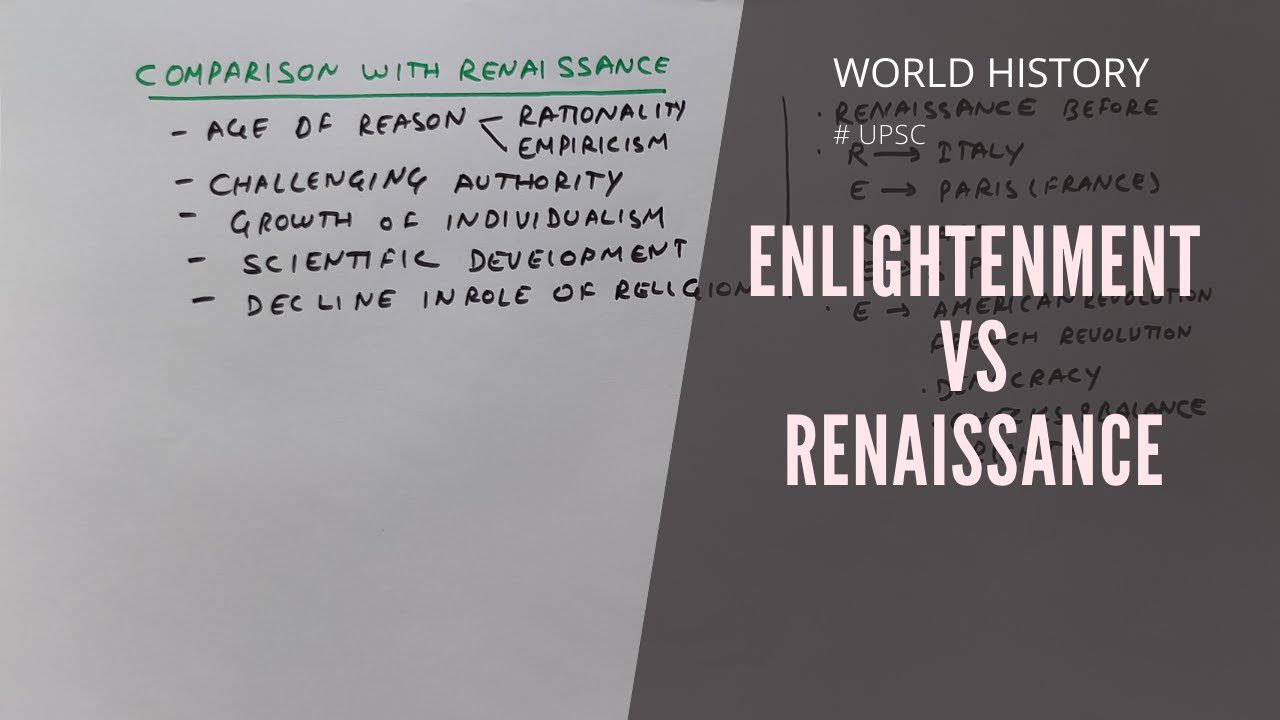The Renaissance and the Enlightenment are two significant periods in Western history that have shaped the modern world. The Renaissance spanned the fourteenth to seventeenth centuries and is known for its revival of classical learning, artistic expression, and scientific discovery. The Renaissance emphasized individualism, secularism, and humanism, paving the way for new ways of thinking. In contrast, the Enlightenment emerged in the eighteenth century and emphasized the importance of empirical knowledge, rational thought, and individual freedom. Enlightenment thinkers championed the value of human rights, leading to political and social reforms that shaped the modern world. Although sharing similarities, the two movements differ in their cultural and artistic legacies, philosophies, and social and political thought.
The Renaissance vs. The Enlightenment: A Historical Comparison
The Renaissance and the Enlightenment are both significant periods in Western history that have significantly impacted the way people think, live and govern themselves to this day. Although they share some similarities, there are marked differences in their philosophical, cultural, and artistic legacies that have shaped the modern world. This article delves into a historical comparison of the Renaissance and the Enlightenment to highlight their similarities and differences in the worlds of art and culture, philosophy, and social and political thought.
The Renaissance
The Renaissance was a period of intense cultural, intellectual, and artistic movement in Europe, which spanned fourteenth to seventeenth centuries. The period is known for its revival of classical learning, artistic expression, and scientific discovery that bridged the medieval period and the modern era. This period revitalized the interest in classical art and culture, which resulted in an explosion of artistry, craftsmanship, and creativity. The Renaissance emphasized individualism, secularism, and humanism, paving the way for new ways of thinking that conflicted with the religious dogma of the medieval era.
Art and Culture
The Renaissance marked a significant shift in aesthetic preference, with artists foregrounding humanistic ideas such as individualism, scientific realism, and perspective. The period witnessed a surge in creative expressions across various mediums, including painting, sculpture, poetry, literature, and music. The Renaissance saw the emergence of some of the world’s most celebrated artists such as Leonardo da Vinci, Michelangelo, and Raphael. The period, notable for its patronage of the arts, saw wealthy merchants and aristocrats commissioning works, leading to the development of art as a profession.
Philosophy
The Renaissance scholars were heavily influenced by the ideas of classical thinkers such as Aristotle, Plato, and Cicero. Renaissance philosophers emphasized the importance of individualism, freedom of thought, and the pursuit of knowledge through empirical methods. They rejected the rigid religious dogma of medieval times, propagated by the Catholic church, and advocated for a questioning attitude towards authority. They believed that knowledge could only be attained through reason and rational inquiry, and they sought to reconcile secular and religious beliefs.
Social and Political Thought
The Renaissance scholars emphasized the importance of individual liberty and the role of the state in protecting the rights of citizens. This period is marked by significant steps towards the modernization of governance systems that would eventually lead to the rule of law, democracy, and constitutional government. Renaissance thinkers, such as Thomas More and Niccolo Machiavelli, proposed new models of statecraft and governance, advocating for the separation of powers and the rule of law. They emphasized the importance of civic responsibility, liberty, and citizen participation in the affairs of the state.
The Enlightenment
The Enlightenment was an intellectual and philosophical movement that emerged in the eighteenth century in Europe. The movement emphasized the importance of empirical knowledge, rational thought and sought to challenge traditional religious and political beliefs. Enlightenment thinkers championed the value of individual freedom and the rights of citizens, leading to significant political and social reforms that shaped the modern world.
Art and Culture
The Enlightenment period saw minimal developments in the field of art compared to the Renaissance period. This is because the movement focused more on scientific inquiry and political reform rather than artistic expression. However, Enlightenment ideas heavily influenced the neoclassical art movement that emerged at the end of the period. Neoclassical art drew ideas from classical Greek and Roman styles and emphasized rationality, linear precision, and geometric composition.
Philosophy
Enlightenment philosophy was rooted in rationalism, empiricism, and skepticism. This intellectual movement was driven by the belief that the pursuit of knowledge through reason and rational inquiry could improve society and human life. Enlightenment philosophers, such as John Locke, Jean-Jacques Rousseau, and Immanuel Kant, rejected traditional religious dogma and advocated for individual liberty, human rights, and free thought. They emphasized the importance of critical thinking, scientific inquiry, and reason in shaping the world.
Social and Political Thought
The Enlightenment marked a significant shift in social and political thought, leading to several revolutions that shook the world. This intellectual movement was driven by the belief that individuals had inherent rights and freedoms that should not be trampled upon by their governments. Enlightenment thinkers, such as Montesquieu, Voltaire, and Rousseau, emphasized the importance of individual liberty, democracy, and human rights. They advocated for the separation of powers, the rule of law, and the establishment of constitutional governance. These ideas eventually led to the American and French Revolutions, which inspired similar changes across the world.
Conclusion
In summary, the Renaissance and the Enlightenment share some similarities in their emphasis on reason, empirical inquiry, and individual freedom. However, they differ in their cultural and artistic legacies, philosophies, and social and political thought. The Renaissance is known for its artistic and cultural explosion while the Enlightenment is remembered for its transformative changes in governance and political thought. Both movements, however, have had an indelible impact on Western civilization, shaping the modern world as we know it.
